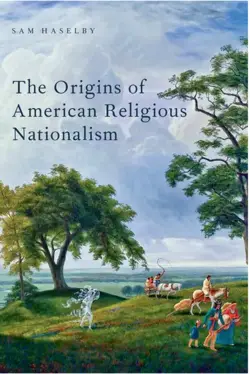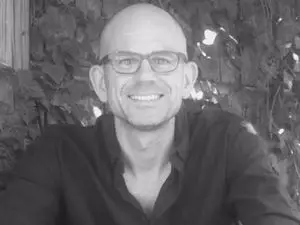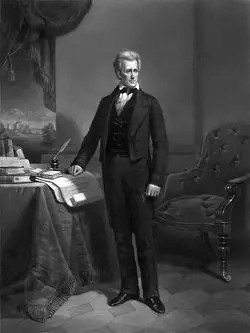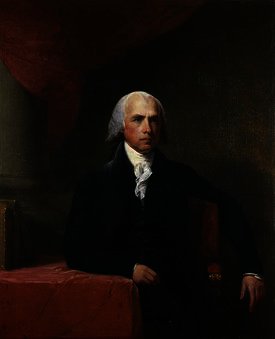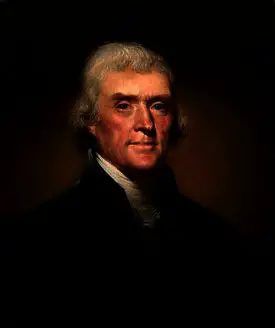Difference between revisions of "Thomas Jefferson, the Founding Fathers and Christianity: Interview with Sam Haselby"
| (19 intermediate revisions by the same user not shown) | |||
| Line 1: | Line 1: | ||
{{Mediawiki:kindleoasis}} | {{Mediawiki:kindleoasis}} | ||
| − | [[File: | + | [[File:OriginsAmericanReligiousNationalism.png|thumbnail|250px|left|''The Origins of American Religious Nationalism'']] |
| − | |||
| − | + | On Twitter, a debate broke out between Annette Gordon-Reed, Sam Haselby, and John Fea on the nature of Thomas Jefferson's religious beliefs. The debate centered on the questions of whether or not Thomas Jefferson could be described as a Christian and wanted the United States to be a Christian nation. Ultimately, the debate could not overcome the 140 character limitations of Twitter. Fortunately, Michael Hattem preserved that debate at [https://storify.com/michaelhattem/jefferson-christianity-and-twitter Jefferson, Christianity, and Twitter]. | |
| − | Sam Haselby is a visiting | + | Instead of recreating the debate, it made more sense to contact one of the participants, Sam Haselby, whose recent book ''[https://www.amazon.com/gp/product/0199329575/ref=as_li_tl?ie=UTF8&camp=1789&creative=9325&creativeASIN=0199329575&linkCode=as2&tag=dailyh0c-20&linkId=aff5f98989dca21ce3fda12a728b5ddb The Origins of American Religious Nationalism]'' (published by [http://global.oup.com/?cc=us Oxford University Press]) examines how a conflict with Protestantism, in the decades following US independence transformed American national identity. It made sense to get his perspective on the concept of American Religious Nationalism, the broad issues that underpinned the recent Twitter debate, and his understanding of early American Christianity. |
| + | |||
| + | The Oxford University Press has released Haselby's book in a new affordable paperback version. This is a fantastic book and it has been getting praise from historians since it was originally released. Gordon Wood described his book in the ''New York Review of Books'' as an "impressive and powerfully argued book - that ....it was American Protestantism and not any sort of classical republicanism that was most important in shaping the development of American nationalism." ''The Origins of American Religious Nationalism'' was published in 2015 and will be republished in paperback by OUP in December 2016. | ||
| + | |||
| + | Sam Haselby is a visiting scholar at the Institute for Religion, Culture and Public Life at Columbia University and the editor of [https://aeon.co/ Aeon magazine]. He recently published an article for Aeon entitled [https://aeon.co/essays/why-did-the-secular-ambitions-of-the-early-united-states-fail American Secular] explaining why the secular movement failed soon after the founding of the United States. | ||
Here is our interview. | Here is our interview. | ||
| − | [[File: | + | [[File:SamHaselby.jpg|thumbnail|300px|Sam Haselby]] |
| − | |||
'''What type of historian are you?''' | '''What type of historian are you?''' | ||
| Line 16: | Line 18: | ||
'''Why were you attracted to this field?''' | '''Why were you attracted to this field?''' | ||
| − | Initially, I | + | Initially, I was attracted to the advent of popular American Protestantism through the Europeanist and South Asianist literature on nationalism and religion and changing class relations. I started researching that and just got drawn deeper and deeper in to what turned out to be a much bigger project. The book is really an anti-nationalist book and in the course of research I acquired a certain respect for the religionists--though I’m constitutionally incapable on that front. |
'''What was the nature of the American Christianity at the end of the 18th Century? Had it completely shifted from its Calvinist roots? How did most American Christians identify themselves?''' | '''What was the nature of the American Christianity at the end of the 18th Century? Had it completely shifted from its Calvinist roots? How did most American Christians identify themselves?''' | ||
| Line 65: | Line 67: | ||
It’s not a matter of judging other people’s faith. It’s a matter of understanding. For sure, in history many people’s ideas and actions in regard to religion remain at best opaque to scholars. That’s not the case with Thomas Jefferson. There are a number of ways to look at the question of if Thomas Jefferson was a Christian. First, let’s look at it politically. In the few instances in which he supported particular religious groups, the Danbury, Connecticut Baptists, for example, it was out of a combination of secular principle and opportunity to hurt political opponents. He spent a long life trying to reduce the role of Christianity in government, in education, in intellectual and social life. | It’s not a matter of judging other people’s faith. It’s a matter of understanding. For sure, in history many people’s ideas and actions in regard to religion remain at best opaque to scholars. That’s not the case with Thomas Jefferson. There are a number of ways to look at the question of if Thomas Jefferson was a Christian. First, let’s look at it politically. In the few instances in which he supported particular religious groups, the Danbury, Connecticut Baptists, for example, it was out of a combination of secular principle and opportunity to hurt political opponents. He spent a long life trying to reduce the role of Christianity in government, in education, in intellectual and social life. | ||
| − | [[File: | + | [[File:Thomas_Jefferson_by_Rembrandt_Peale,_1800.jpg|thumbnail|275px|Thomas Jefferson 1800]] |
Second, let’s look at it intellectually. Intellectually, his affinity was with philosophy, anti-Christian Enlightenment philosophy, not theology. He rejected core tenets of Christian theology, and composed a book to take everything supernatural out of religion. As a rule, I don’t think historians should use theological criteria for understanding if someone was a Christian, because then once you start making theological judgments you sort of leave history. That said, if a historian were to use a theological measure, rejecting the divinity of Jesus and all supernatural elements of the religion would not be bad grounds for exclusion. | Second, let’s look at it intellectually. Intellectually, his affinity was with philosophy, anti-Christian Enlightenment philosophy, not theology. He rejected core tenets of Christian theology, and composed a book to take everything supernatural out of religion. As a rule, I don’t think historians should use theological criteria for understanding if someone was a Christian, because then once you start making theological judgments you sort of leave history. That said, if a historian were to use a theological measure, rejecting the divinity of Jesus and all supernatural elements of the religion would not be bad grounds for exclusion. | ||
| Line 77: | Line 79: | ||
John Fea calls Jefferson not a Christian, but a follower of Jesus. There’s an old saying that sometimes the truth is a long road from the facts. It’s a fact that Jefferson was a follower of Jesus. But it’s misleading to call him that precisely because of what happened when Fea did. Gordon-Reed said “Yes, Jesus the Redeemer!” And, if we’re to believe the Christians, there’s two whole words of difference between that and “Yes, Jesus the secular ethicist!” | John Fea calls Jefferson not a Christian, but a follower of Jesus. There’s an old saying that sometimes the truth is a long road from the facts. It’s a fact that Jefferson was a follower of Jesus. But it’s misleading to call him that precisely because of what happened when Fea did. Gordon-Reed said “Yes, Jesus the Redeemer!” And, if we’re to believe the Christians, there’s two whole words of difference between that and “Yes, Jesus the secular ethicist!” | ||
| − | '''Finally, another interesting part of the discussion centered on whether Jefferson wanted the United States to be a Christian nation. | + | '''Finally, another interesting part of the discussion centered on whether Jefferson wanted the United States to be a Christian nation. I’m not quite sure what that means. Peter Onuf and Annette Gordon Reed state that Jefferson made those statements. What do you think Jefferson might have meant by those statements? What would a Jeffersonian Christian nation have looked like?''' |
| − | I’m not quite sure what that means. Peter Onuf and Annette Gordon | ||
For Jefferson it was pretty simple. Jefferson meant the United States would be, and should be, Unitarian. It was quixotic then too. | For Jefferson it was pretty simple. Jefferson meant the United States would be, and should be, Unitarian. It was quixotic then too. | ||
| Line 92: | Line 93: | ||
*[[Engineering Victory during the Civil War: Interview with Thomas F. Army, Jr.]] | *[[Engineering Victory during the Civil War: Interview with Thomas F. Army, Jr.]] | ||
</div> | </div> | ||
| + | {{contributors}} | ||
Revision as of 02:03, 21 April 2017
On Twitter, a debate broke out between Annette Gordon-Reed, Sam Haselby, and John Fea on the nature of Thomas Jefferson's religious beliefs. The debate centered on the questions of whether or not Thomas Jefferson could be described as a Christian and wanted the United States to be a Christian nation. Ultimately, the debate could not overcome the 140 character limitations of Twitter. Fortunately, Michael Hattem preserved that debate at Jefferson, Christianity, and Twitter.
Instead of recreating the debate, it made more sense to contact one of the participants, Sam Haselby, whose recent book The Origins of American Religious Nationalism (published by Oxford University Press) examines how a conflict with Protestantism, in the decades following US independence transformed American national identity. It made sense to get his perspective on the concept of American Religious Nationalism, the broad issues that underpinned the recent Twitter debate, and his understanding of early American Christianity.
The Oxford University Press has released Haselby's book in a new affordable paperback version. This is a fantastic book and it has been getting praise from historians since it was originally released. Gordon Wood described his book in the New York Review of Books as an "impressive and powerfully argued book - that ....it was American Protestantism and not any sort of classical republicanism that was most important in shaping the development of American nationalism." The Origins of American Religious Nationalism was published in 2015 and will be republished in paperback by OUP in December 2016.
Sam Haselby is a visiting scholar at the Institute for Religion, Culture and Public Life at Columbia University and the editor of Aeon magazine. He recently published an article for Aeon entitled American Secular explaining why the secular movement failed soon after the founding of the United States.
Here is our interview.
What type of historian are you?
My area of specialization is 18th and 19th century American religion and political culture.
Why were you attracted to this field?
Initially, I was attracted to the advent of popular American Protestantism through the Europeanist and South Asianist literature on nationalism and religion and changing class relations. I started researching that and just got drawn deeper and deeper in to what turned out to be a much bigger project. The book is really an anti-nationalist book and in the course of research I acquired a certain respect for the religionists--though I’m constitutionally incapable on that front.
What was the nature of the American Christianity at the end of the 18th Century? Had it completely shifted from its Calvinist roots? How did most American Christians identify themselves?
I’m not sure how much it means to say that American Christianity at the end of the 18th century had Calvinist roots. Religion as lived by people often has little to do with theological movements. American Christianity at the end of the 18th century is, generally speaking, Reformed Protestant and anti-Catholic. That’s a pretty big tent.
How did secularism develop in the United States? Was it uniquely American?
Secularism as a theological development, the secular as a philosophical idea, and secularization as a political project are related but distinct things. Neither the theological development nor the philosophical idea of the secular is uniquely American. The French revolutionary model of secularization, which follows the secular’s American moment, is more radical and influential. So none of them are uniquely American.
Nonetheless, secularization takes historic step forward in late 18th century Virginia, for interesting reasons. American secularism belongs firmly within the bequest of the Virginia Enlightenment. It’s a bequest that includes American slavery and American racism, the US Constitution, and the country’s first and last dynasty of Presidents. Secularism came out of that enduring legacy. But it was a fanciful vision, politically, and it faltered because it was never popular in principle and its political requirements were directly counter to those of slavery.
Your recent book The Origins of American Religious Nationalism argues that the conflict within American Protestantism ultimately helped create a “religious nationalism.” What is "religious nationalism?”
Why are the founding fathers, their purported intentions, and the documents of the American revolution so central to American political discourse? You don’t see that with William Pitt in Britain. The closest anyone comes to fulfilling that role in the UK, and it’s not that close, is Churchill. There’s no comparable phenomenon in Canadian political culture. It would be retrograde to cite Bismarck as an authority in contemporary German life. The role of the American revolution in US political culture is peculiar, and it’s best understood as a form of nationalism built from some Protestant raw materials.
So American religious nationalism is the set of conventions, derived in part from Protestantism, that is the predominant form of American nationalism. Its main components are the jeremiad, and the way that the Revolution, its texts and its leading figures (that slightly patristic phrase ‘founding fathers’) function in American nationality. That’s American religious nationalism.
You argue that this religious nationalism grew over time. When did this process start and when did it coalesce?
My book covers the mid 18th century to Native American removal in the 1830s, because that’s a major moment for American religious nationalism. Andrew Jackson’s speeches on Indian removal ought to be taught alongside Abraham Lincoln’s second inaugural and Gettysburg Address. They are the same genre. They are the executive versions of American religious nationalism coming to bear on the shape of the political community. They are exactly the same in form, but for the opposite purposes of exclusion. Indian removal was very important for American nationality, my book argues. That’s why the cover of the book is a painting from the Cree artist Kent Monkman, his arresting and grand reinterpretation of the Hudson River Valley school of “manifest destiny.”
One of the key moments of coalescence is the War of 1812 and the Hartford Convention. They lead to the advent of the systematic Anglo-American missionary movement. Two things about the missions movement are really sort of definitive. First, it’s not a general American movement. It’s New England Federalism reconstituting itself with the considerable help of mid-Atlantic capital. It’s the Whig Party before the Whig Party, because things tend to happen in religion before they happen in politics. Second, its financial and institutional resources are unlike anything else in the early American republic. One small example, in the first decade of its existence, the American Tract Society alone published a staggering 531,000,000 pages of 754 different tracts. It distributed 480,000,000 of these pages. In 1830, for a country of just under 13 million people, that’s 37 ½ pages of Protestant pamphlet for every man, woman and child in the country. If the British are a people of the novel, and the French a people of the philosophical tract, Americans are a people of the Protestant pamphlet.
Do we still have a “religious nationalism?”
It’s the floor. Liberals and conservatives, leftists and reactionaries, stand on it. In some ways it is necessary. The US is a big and odd and unnatural and discordant nation. How would Americans talk to each other without standing on the founding fathers? It also, I think, limits debate and inhibits thought.
Recently, there has been a political debate about how religious the founding fathers were and whether the United States was founded as an explicitly “Christian” nation. Today, the founding documents of the United States are viewed by some as almost quasi-religious documents. On the other hand, you have argued that the United States was “founded by visionary secularists.” What accounts for these divergent views of our founding? Are the different religious beliefs of the founders as the question even answerable?
There is no divergence. I have argued that James Madison and Thomas Jefferson were visionary secularists and that they launched what was a historic, if ultimately faltering, and kind of feeble secularization project. That is true. Other notable Americans of the revolutionary era were acutely Protestant. Patrick Henry and John Jay, for example. They were deeply religious and wanted the US to be so too. So was Timothy Dwight. So were many, many others of the revolutionary generation. Most people probably wanted the US to be a devout country. But there was no agreement on what that meant. The range of positions was broad, very broad.
It is crucial however to understand that “Christian nation” has always been a term of bigotry and exclusion. First, when Americans of the 18th and 19th century used the term they were saying Catholics were not Christians. Then--as now--most Christians in the world were Catholic. It makes no sense to call a country hostile to most of the world’s Christians a “Christian nation.”
Nor it is possible to just devolve to “Protestant nation.” The US was not founded as a Protestant nation in any meaningful sense. Americanists tend to forget that the House of Hanover was the sword and shield of Protestantism in a largely Catholic world. The last thing anyone driven by a desire to form a Protestant nation would do is secede from Great Britain. Religion was just not a primary or secondary motive for American independence or the US national founding.
Recently there was a debate on twitter between yourself, John Fea, and Annette Gordon-Reed Thomas Jefferson’s religious beliefs. There was a fairly big divide. The biggest question centered around whether or not he was a Christian. What were Thomas Jefferson’s beliefs?
Jefferson said he was a sect by himself. He exaggerated. He was deist. His views were those conventional to the deism relatively popular among intellectuals of his era and class. The watchmaker God. No miracles. Jesus is a moral exemplar but not Christ, not the son of God. No divine revelation. No resurrection. Interested in science, natural history, and philosophy as substitutes and superior alternatives to religion and theology. He praised the English dissident and scientist Joseph Priestley’s books on Christianity, which were attacks on divine revelation and the doctrine of the trinity and rambling, vituperative manifestos for science and rationalism.
Considering Jefferson’s religious beliefs, would those have been described as Christian by people during his lifetime or now? Was there a lot of flexibility about what made someone a Christian?
There was a great deal of flexibility. And yet still Jefferson did not come close to qualifying.
In your twitter debate with Annette Gordon-Reed, you two disagreed over whether Jefferson could be defined as a Christian. You both seemed to approach this question from different angles. Her research shows that Jefferson sincerely believed that he was a Christian but you clearly don’t think that Jefferson’s religious beliefs make him a Christian unless you redefine the term. Essentially, Professor Gordon-Reed stated that she was “not comfortable with judging other people’s faith.” Is that something historians should do? When is it appropriate to judge the nature and character of someone's religious faith?
Annette Gordon-Reed maintained that Jefferson was a Christian because he once referred to himself as “a primitive Christian.” Any questioning of that self-description, she suggested, was an arrogating impropriety. That’s a strange position for a historian to take. Jefferson also said--twice that I know of--that God was against slavery. Does she think he was an abolitionist?
It’s not a matter of judging other people’s faith. It’s a matter of understanding. For sure, in history many people’s ideas and actions in regard to religion remain at best opaque to scholars. That’s not the case with Thomas Jefferson. There are a number of ways to look at the question of if Thomas Jefferson was a Christian. First, let’s look at it politically. In the few instances in which he supported particular religious groups, the Danbury, Connecticut Baptists, for example, it was out of a combination of secular principle and opportunity to hurt political opponents. He spent a long life trying to reduce the role of Christianity in government, in education, in intellectual and social life.
Second, let’s look at it intellectually. Intellectually, his affinity was with philosophy, anti-Christian Enlightenment philosophy, not theology. He rejected core tenets of Christian theology, and composed a book to take everything supernatural out of religion. As a rule, I don’t think historians should use theological criteria for understanding if someone was a Christian, because then once you start making theological judgments you sort of leave history. That said, if a historian were to use a theological measure, rejecting the divinity of Jesus and all supernatural elements of the religion would not be bad grounds for exclusion.
Finally, let’s look at the matter historically. Historically, Christianity is just what Christians say and do. Nothing more, nothing less. Historically, it’s really up to one’s contemporaries, to what Christians of that time did and said, and they were sure Jefferson was not one of them. Whether by historical, intellectual, or political criteria, Jefferson cannot be called a Christian.
Incidentally, the term Gordon-Reed used to support her case--“primitive Christian”--is kind of interesting. She said he was a Christian because he once referred to himself as a “primitive Christian.” Early modern intellectuals, particularly those from a Protestant tradition, sometimes used that term to refer to the time before the Council of Nicea in the 4th century. In their idealized view, that is when Christianity was corrupted. “Primitive Christian” was a way of laying claim to the purported heart or spirit of the Christian message, while distancing oneself from actual churches, first the Vatican but others too. It was all based on what we now know was a very inaccurate view of early Christianity. Late antique or early Christianity was actually a tumultuous, wild thing but Jefferson and his generation didn’t think that. They thought “primitive Christianity” was pure and harmonious and simple.
In any event, by using the term “primitive Christian” in 1819, Jefferson is taking a weapon that Protestant intellectuals forged to delegitimize Catholicism and turning it against the Protestants. It’s in a way typical Jefferson. Give up nothing. But it is close to the opposite of the simple, definitive statement of devotion or identification that Gordon-Reed claimed. In citing that term, she and Onuf are like prosecuting attorneys unwittingly introducing exculpatory evidence.
John Fea calls Jefferson not a Christian, but a follower of Jesus. There’s an old saying that sometimes the truth is a long road from the facts. It’s a fact that Jefferson was a follower of Jesus. But it’s misleading to call him that precisely because of what happened when Fea did. Gordon-Reed said “Yes, Jesus the Redeemer!” And, if we’re to believe the Christians, there’s two whole words of difference between that and “Yes, Jesus the secular ethicist!”
Finally, another interesting part of the discussion centered on whether Jefferson wanted the United States to be a Christian nation. I’m not quite sure what that means. Peter Onuf and Annette Gordon Reed state that Jefferson made those statements. What do you think Jefferson might have meant by those statements? What would a Jeffersonian Christian nation have looked like?
For Jefferson it was pretty simple. Jefferson meant the United States would be, and should be, Unitarian. It was quixotic then too.
Related DailyHistory.org Articles
- Interview:African American Soldiers During the Civil War: Interview with Author Bob Luke
- Angels of the Underground: Interview with Theresa Kaminski
- Why Was the Battle of Antietam a Pivotal event in the American Civil War?
- Hodges' Scout: Interview with Len Travers
- Engineering Victory during the Civil War: Interview with Thomas F. Army, Jr.
Admin and EricLambrecht
